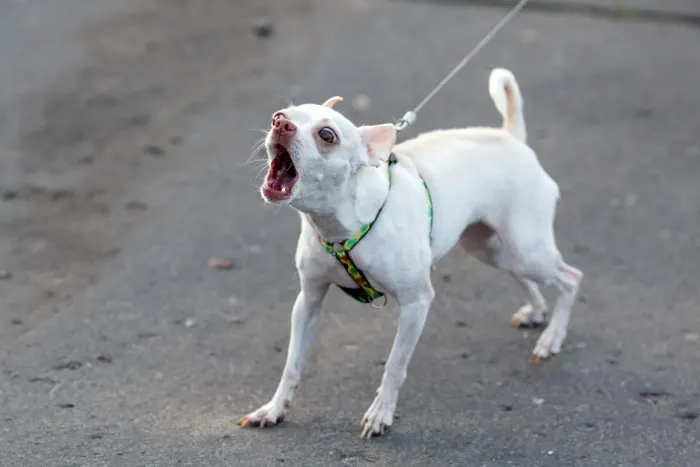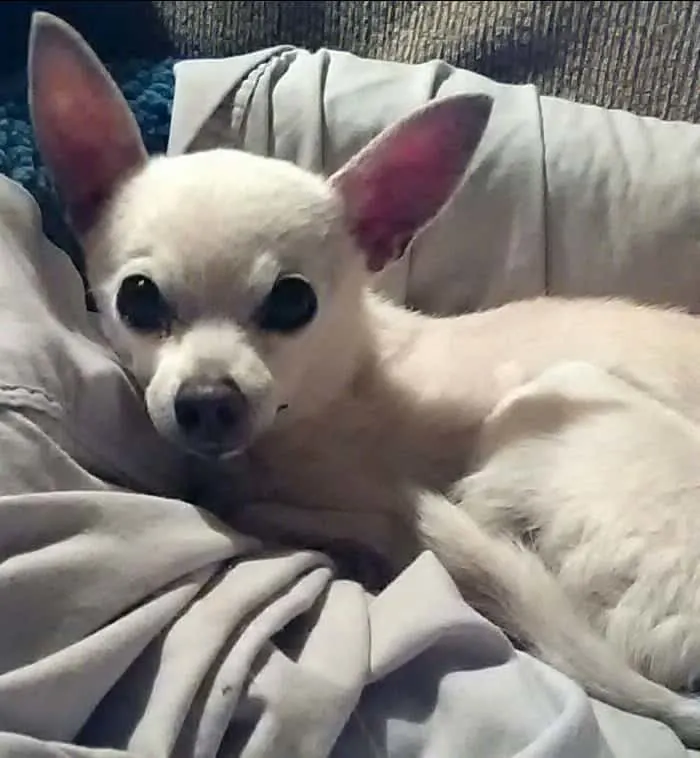As a professional dog trainer, the term “small dog syndrome” is one that I hear and use daily. Small dogs (such as chihuahuas) have the reputation to be snarly, barky and nervous – which is true in some cases!
The good news is that you can absolutely avoid small dog syndrome in your lap dog with a few precautions and habits. Today we will look at the negative behaviors that are common in small dogs as well as how you can go about preventing it!

Reactivity
A very common small dog problem is reactivity. Reactivity can be directed against a number of different triggers: from people to other dogs to sounds (such as the doorbell).
Reactivity is often situation-specific – your dog can for example be reactive towards other dogs when he is on leash, but fine when he is off-leash.
Many small dogs develop this behavior problem due to their size. On the one hand, any trigger is more intimidating and scary to them because they are simply so little! On the other hand, owners tend to ignore early warning signs of reactivity because they “do not seem so bad”. A Doberman or Mastiff who growl is much more likely to be taken seriously than an 8 pound Chihuahua.
In order to prevent reactivity in your small dog, you should make sure to provide a lot of positive exposure to different situations for him. When it comes to socializing your dog, there should be no difference between a teacup and a giant dog!
If you find that you are skipping out on socializing your dog because he is small, think again: Reactivity will be a tricky and stressful issue once fully developed. It is best to prevent it by providing plenty of exposure early on.
Incessant Barking

Non-stop barking is another common sign of small dog syndrome. Do you have a little dog who barks forever at the slightest triggers? They might be somebody knocking on your door, a dog barking on TV or you switching on the vacuum. Barking – like reactivity – needs to be addressed through well-planned exposure. You want your dog to form positive associations towards his triggers.
A secret dog trainer tip is to record the sounds that make your dog bark like crazy. Then you play them at a low volume and feed your dog treats as you are doing so. This will help him connect the treats with the sounds and create a positive connection. Over time, hearing different sounds will not send your dog into a barking frenzy anymore. For some dogs, this training process can take several weeks or even months – depending on how ingrained their barking response is.
Constant Motion
Some small dogs are constantly in motion. They run around the house, they are always busy-busy-busy and cannot lay down and take a rest. While this may seem cute to us, it is actually not natural for dogs to always be awake.
As carnivores, their ideal sleep-and-wake-rhythm is different from humans. Dogs do best if they are awake for 3-4 hours and then rest for 1-2 hours. They need a lot more sleep overall than we do – otherwise they will be more reactive, more snarly, and bark more – basically their overall small dog syndrome will become worse!
A good way to help your small dog keep a healthy daily rhythm is to implement a schedule for activities. Dogs do not do so well if they are always surprised by what happens next. Knowing at which times they go for walks, play or sleep will help them feel secure.
Develop a schedule that works with your family’s lifestyle and stick to it! You will see that after a few weeks implementing the new routine, your dog will be less “wiggly” and able to relax and not always be in motion.
Not Listening

Many small dog owners struggle with their dogs not listening. This is not actually a problem specific to small dogs, but applies to all dogs that have not yet been trained enough.
Like with the reactivity, it is easier to ignore a small dog’s bad manners than a large dog’s. When it comes to training, you need to invest as much time and effort as with a large dog – or your dog will not be well-behaved.
In my training classes, I very rarely see small dogs. The ones that do come though are exceptionally well-behaved and catch onto the training very quickly. Most small dog breeds are highly intelligent and love to please their owner.
If you are unhappy with your dog’s obedience and manners, try taking him to training classes – you will be surprised at how well he does and how fast he learns.
The Bottom Line
Small Dog Syndrome mostly originates from the fact that owners of little dogs don’t always invest as much time and effort into working with their dogs as owners of large dogs.
It is a misconception that smaller dogs require less training, exercise or manners. Every dog will develop bad habits if he is not socialized, exercised and trained. It is easy to ignore the first signs of disobedience in smaller breeds – because they just are little enough to not be a big problem.
If you want your small dog to be a well-behaved companion, you need to treat him just like a big dog. Take him to training classes, expose him to different social situations, work with him on existing behavioral problems and establish a daily schedule. If you are consistent with this just for a few weeks, you will soon see great results and small dog syndrome will be a problem of the past!

Jayne Long
Sunday 4th of April 2021
My 3 month old chihuahua likes to nip and bite me. Not sure if this is something he will outgrow or if I should take him to obedience classes
Marie
Saturday 10th of April 2021
@Cathy, My chi is nearly four months and as we all know they seem to be teething for ever...I have had him since he was seven weeks old....just take your hand away and I shout no biting...you have to give him something else to bite on soft toys he can rag on and keep distracting him,with other little games like fetch and drop...very hard work at start..but they soon catch on,very clever little dogs.
Cathy
Wednesday 7th of April 2021
I'd take him to an obedience class if you can.